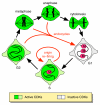Replication licensing--defining the proliferative state?
- PMID: 11849970
- PMCID: PMC3604914
- DOI: 10.1016/s0962-8924(01)02203-6
Replication licensing--defining the proliferative state?
Abstract
The proliferation of eukaryotic cells is a highly regulated process that depends on the precise duplication of chromosomal DNA in each cell cycle. Regulation of the replication licensing system, which promotes the assembly of complexes of proteins termed Mcm2-7 onto replication origins, is responsible for preventing re-replication of DNA in a single cell cycle. Recent work has shown how the licensing system is directly controlled by cyclin-dependent kinases (CDKs). Repression of origin licensing is emerging as a ubiquitous route by which the proliferative capacity of cells is lowered, and Mcm2-Mcm7 proteins show promise as diagnostic markers of early cancer stages. These results have prompted us to propose a functional distinction between the proliferative state and the non-proliferative state (including G0) depending on whether origins are licensed.
Figures





References
-
- Blow JJ, Laskey RA. A role for the nuclear envelope in controlling DNA replication within the cell cycle. Nature. 1988;332:546–548. - PubMed
-
- Diffley JFX. Building the perfect switch. Current Biol. 2001;11:R367–370. - PubMed
-
- Lei M, Tye BK. Initiating DNA synthesis: from recruiting to activating the MCM complex. J. Cell Sci. 2001;114:1447–1454. - PubMed
-
- Nguyen VQ, et al. Cyclin-dependent kinases prevent DNA re-replication through multiple mechanisms. Nature. 2001;411:1068–1073. - PubMed
Publication types
MeSH terms
Substances
Grants and funding
LinkOut - more resources
Full Text Sources
Other Literature Sources
Miscellaneous

